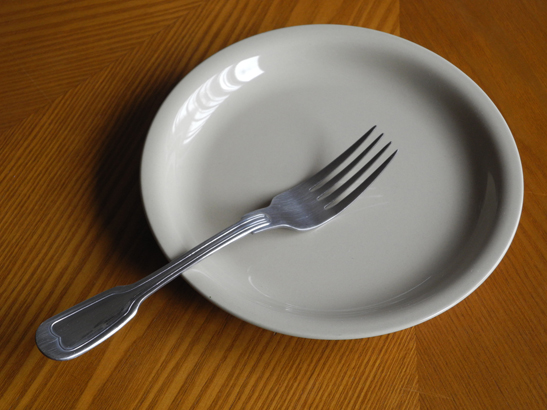It was when I returned to the US after a year abroad that I first became interested in fasting. Whether I was escaping muggers in Bogotá, or taking cover from tear gas during a student protest in Valparaíso, my adventures in South America had given me a hearty appetite: I never knew what would happen next, so I had to keep the calories coming. But back in the States, life became standardized. Surprise and danger ceased to be a feature of my day, and suddenly I felt that I was eating too much.
In Buenos Aires, I would consume steamed fish and vegetables twice daily, with fruit and nuts filling the space in between. I often mixed things up with beef or poultry, and ate so many mandarin oranges that the Bolivian fruit vendors down the street would start preparing a sack when they saw me coming. Even then I was still hungry, and would sometimes sneak a cookie or two at night. But in Denver my appetite vanished.
There, after eating, I would feel heavy and glutted with energy. Food stuck inside me, and I was always full when it came time to eat again. At first I thought that I would switch things up, and decided to consume some grains. This introduced other problems, like stomach pains and flatulence. It was only when I was a few days away from moving back to my hometown in Missouri and became too nervous to eat that I realized I had been consuming too much.
Within a few hours of skipping breakfast, I began to feel lighter, more clear-headed, and energetic. “Only eat what you need,” I thought, my experience reinvigorating this platitude. I had stumbled onto a new way of viewing my body: it was an organism, and food was its fuel.
Before I’d just been stuffing food in my mouth, either to address hunger, or to feel comfort. When I broke my fast that evening, I discovered that I’d gained the heightened awareness necessary to consider each mouthful that I ate. “If I eat this,” I found myself thinking while contemplating a slice of strawberry, “what effect will it have?”
There’s speculation that our ancestors regularly experienced food shortages – going without sustenance for days at a time – and that our bodies evolved to expect them. What is known with certainty is that the body responds in a distinct way to a lack of food.
During the first day, the liver uses up its stores of glycogen, making glucose to feed cells. When glycogen stores are exhausted, usually around the second day, the body starts breaking down fat and muscle. Then, after three days, the liver spares muscle, and begins to produce ketone from fat. This process, called ketosis, continues until fat stores are depleted or food is consumed.
Whether or not fasting is beneficial for the body is still controversial. In an effort to illuminate this topic, the Los Angeles Times interviewed several medical professionals, among them Mark Mattson, PhD.
Researchers aren't sure why the body apparently benefits from a state of mini-starvation. One theory is that the process produces just enough stress in cells to be good. "What our evidence suggests is that nerve cells in animals that are on dietary energy restriction are under mild stress," Mattson says. "It's a mild stress that stimulates the production of proteins that protect the neurons against more severe stress."
According to Mattson’s Nature Medicine profile, he became interested in fasting while researching caloric restriction. His early studies showed that “a low-calorie diet protects the brain, as it does other organs, from the ravages of age-associated disorders such as Alzheimer’s and Parkinson’s diseases.”
Mattson's biggest public splash came from a study published last year, showing that regular fasting confers the same health benefits as total caloric restriction. The team showed that mice starved every other day, but allowed to gorge in between, consume only 10% fewer calories than normal, but still have healthier blood glucose levels and recover better from brain injury. This supports the idea that semistarvation boots up stress-response proteins, which then protect cells from aging and disease. Mattson is now hunting for those protective molecules.
Exciting stuff, but not everyone’s jumped on the bandwagon. WebMD suggests there are no proven benefits to fasting, and warns those considering a fast to check with their doctors first.
Apparently, the mental clarity that I experienced from not eating can be aimed toward higher pursuits, for, while doctors remain skeptical, religions agree about fasting’s advantages. Whether motivated by a desire for self-restraint or a willingness to repent, fasting is embraced by the world’s creeds as an effective way to connect with God. There’s even the remarkable story of Prahiad Jani, an 83-year-old practitioner of Hinduism who claims to have been fasting since World War II, sustained only by a spiritual elixir supplied to him by Amba, his patron goddess. “I am strong and healthy,” he recently told reporters, “because God wants me to be.”
